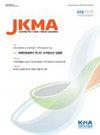Association between age-related hearing loss and cognitive decline
IF 0.5
Q3 MEDICINE, GENERAL & INTERNAL
引用次数: 0
Abstract
Background: Presbycusis, or age-related hearing loss, is a prevalent condition characterized by the gradual deterioration of hearing with age. The resulting impairments in auditory function lead to reduced speech perception in noisy environments and often have a negative impact on cognitive, behavioral, and psychosocial functions in the elderly population.Current Concepts: The proposed etiological mechanisms linking presbycusis to cognitive decline or dementia include the common-cause hypothesis, cognitive load hypothesis, cascade hypothesis, and overdiagnosis or harbinger hypothesis. Moreover, the challenges posed by the rapidly aging population in several countries, including Korea, highlight the increasing social impact of hearing loss and dementia. Consequently, interventions for hearing rehabilitation, such as the use of hearing aids and implantable hearing devices, have paramount importance in mitigating the adverse effects of hearing loss on cognitive impairment and dementia.Discussion and Conclusion: The implementation of prevention and rehabilitation programs for hearing loss in the elderly is crucial for alleviating the socioeconomic burden associated with the welfare of the aging population. However, many economically vulnerable elderly individuals reportedly do not use hearing aids, even though they experience considerable inconvenience resulting from hearing loss, primarily due to inadequate financial support. Therefore, implementing a comprehensive national policy to support hearing aid usage among elderly individuals with moderate hearing loss holds significant potential for reducing their risk of cognitive impairment and dementia.年龄相关性听力损失与认知能力下降之间的关系
背景:老年性耳聋或与年龄相关的听力损失是一种常见的疾病,其特征是听力随着年龄的增长而逐渐恶化。由此导致的听觉功能损伤导致在嘈杂环境中的言语感知能力下降,并经常对老年人的认知、行为和社会心理功能产生负面影响。当前概念:目前提出的将老年性痴呆与认知能力下降或痴呆联系起来的病因机制包括共因假说、认知负荷假说、级联假说和过度诊断或先兆假说。此外,包括韩国在内的一些国家的人口迅速老龄化所带来的挑战凸显了听力损失和痴呆症日益严重的社会影响。因此,听力康复的干预措施,如使用助听器和植入式听力装置,对于减轻听力损失对认知障碍和痴呆的不利影响至关重要。讨论与结论:老年人听力损失的预防和康复项目的实施对于减轻与老龄人口福利相关的社会经济负担至关重要。然而,据报道,许多经济上脆弱的老年人不使用助听器,尽管他们经历了听力损失带来的相当大的不便,主要是由于财政支持不足。因此,实施一项全面的国家政策,支持中度听力损失的老年人使用助听器,对于降低他们患认知障碍和痴呆的风险具有重大潜力。
本文章由计算机程序翻译,如有差异,请以英文原文为准。
求助全文
约1分钟内获得全文
求助全文
来源期刊

Journal of The Korean Medical Association
Medicine-General Medicine
CiteScore
0.50
自引率
0.00%
发文量
84
审稿时长
4-8 weeks
期刊介绍:
The Journal of the Korean Medical Association (JKMA) is the official peer-reviewed, open-access, monthly journal of the Korean Medical Association (KMA). It contains articles in Korean or English. Its abbreviated title is ''J Korean Med Assoc''. The aims of the Journal include contributing to the treatment of and preventing diseases of public health importance and to improvement of health and quality of life through sharing the state-of the-art scientific information on medicine by the members of KMA and other national and international societies.
 求助内容:
求助内容: 应助结果提醒方式:
应助结果提醒方式:


